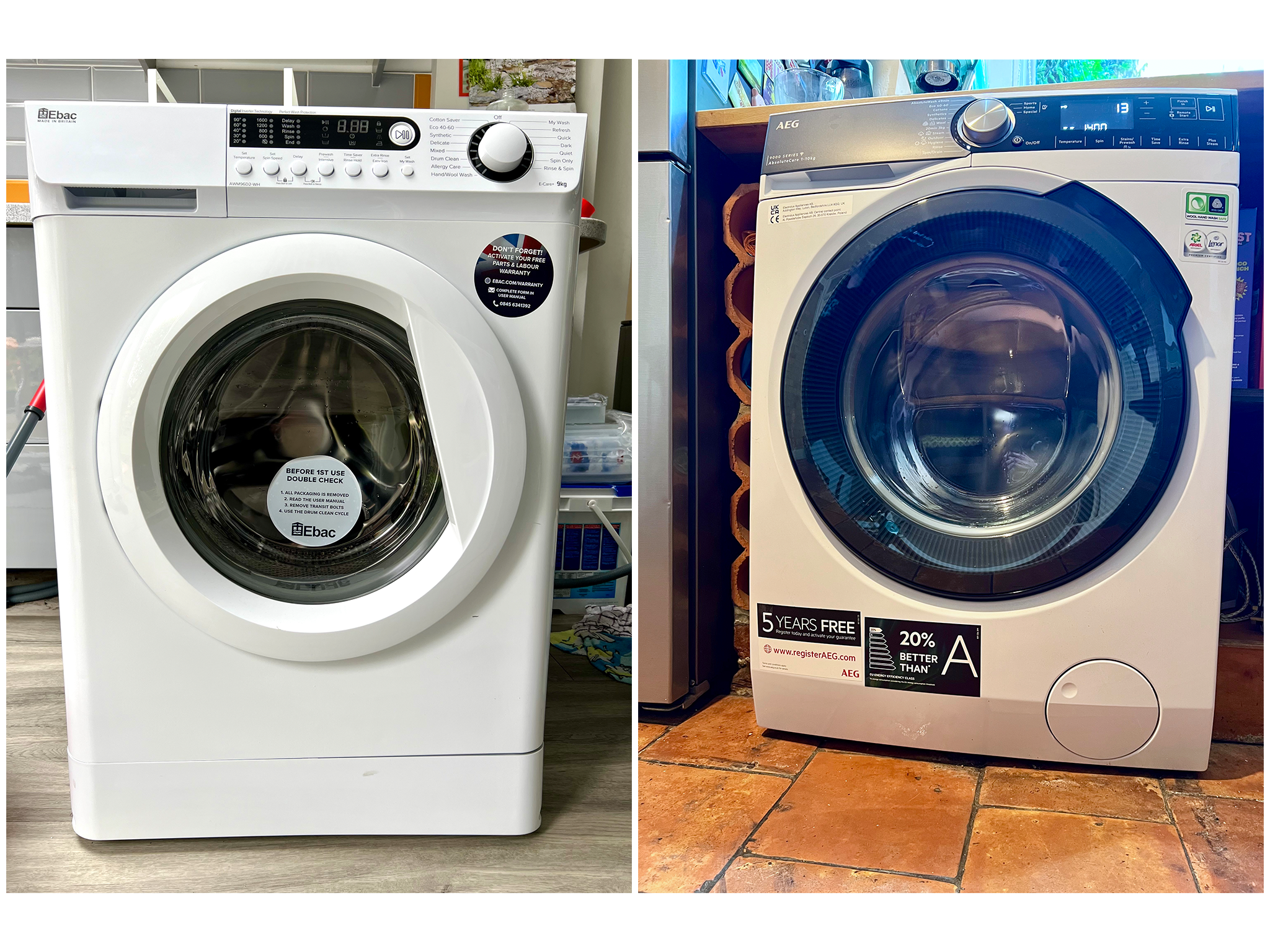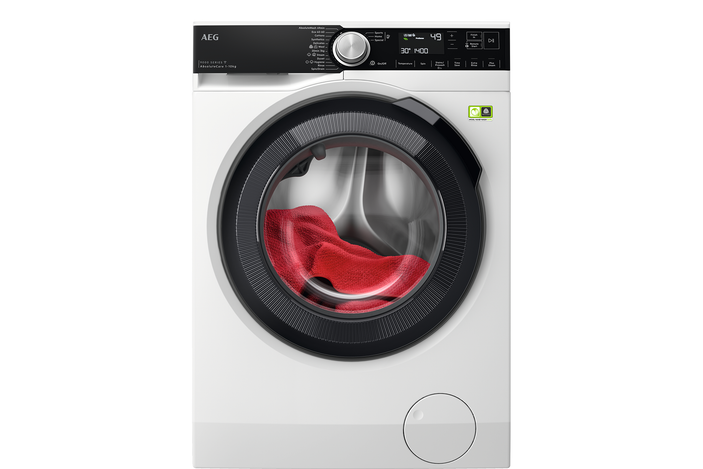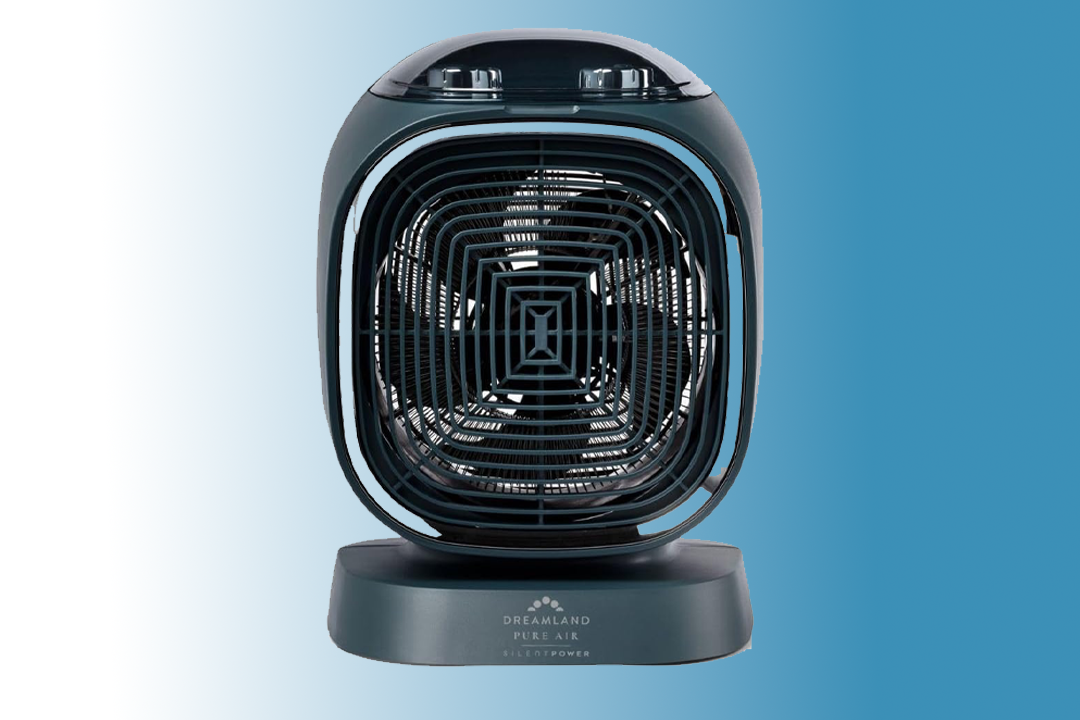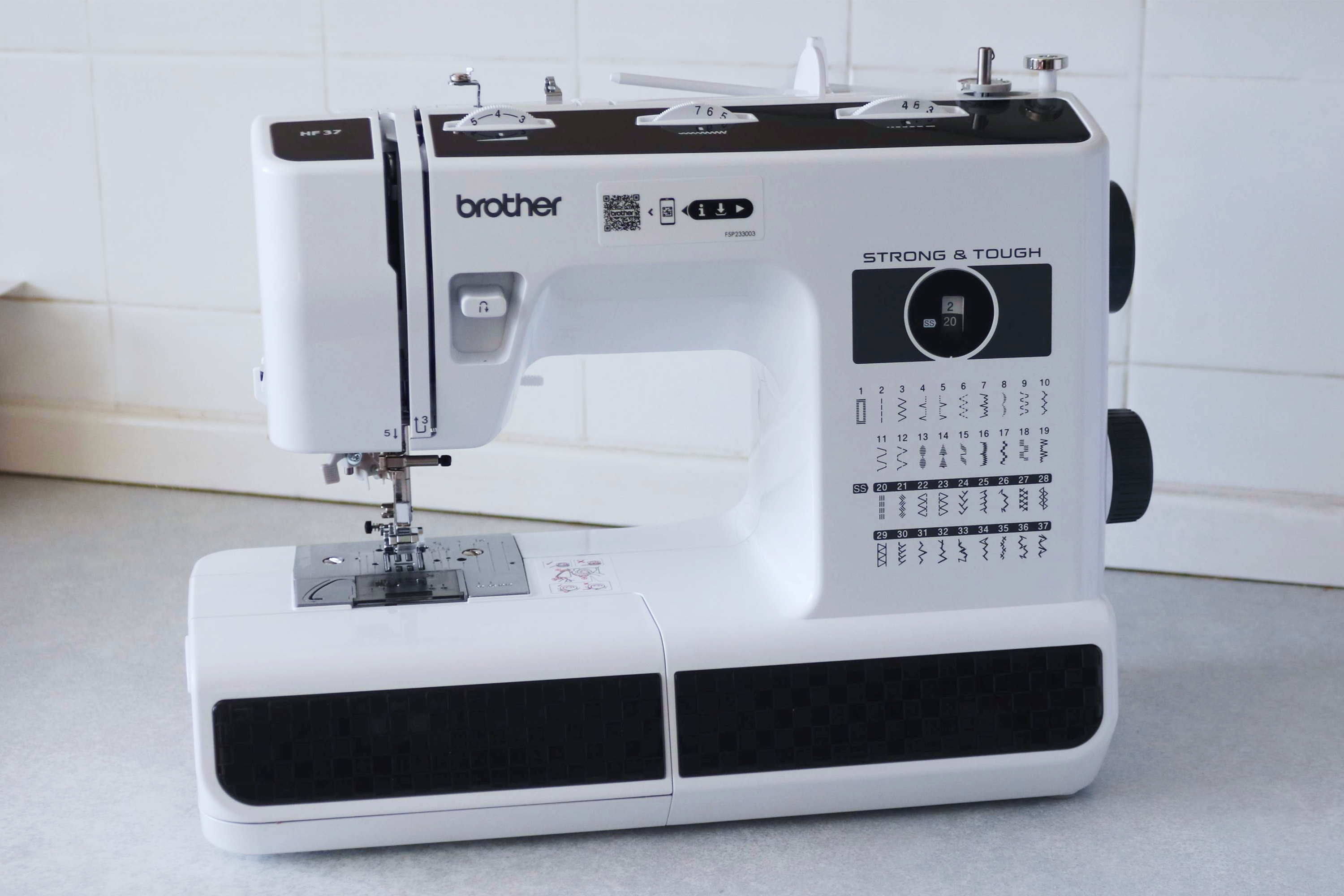The Independent's journalism is supported by our readers. When you purchase through links on our site, we may earn commission. Why trust us?
6 best washing machines that make doing laundry a breeze
In a spin about which washing machine to buy? Our tried and tested guide has you covered

Unless you are part of the no-wash movement, doing at least one load of laundry is likely a pillar of your weekly routine. Thankfully, the back-breaking days of washboards and scrubbing are long behind us, and we now have the best washing machines to do all the hard work for us.
The latest generation of machines takes washing laundry to the next level, with smart features such as synced-up apps, AI-assisted stain removal and steam cleaning. Washing machine brands are also mindful of the climate crisis and have designed units with excellent energy efficiency, specific eco programs and reduced water consumption. So, now your conscience can be as clean as your laundry.
But with this advancement in technology, it can be hard to know what machine is right for your home. With this in mind, our team of testers have been putting some of the best washing machines to the test to see which are worth splashing the cash on.
The best washing machines for 2026 are:
- Best washing machine overall – Haier washing machine i-pro series 7 plus: £449, Amazon.co.uk
- Best budget buy – Hoover H-wash 500: £399, Amazon.co.uk
- Best smart washing machine – Samsung series 8 AI energy washing machine: £809, Samsung.com
- Best top-end option – Asko steel seal washing machine: £849, Hughes.co.uk
How we tested

Our team of testers looked at several things when reviewing each washing machine, including how well they washed laundry, capacity and energy efficiency. They also looked at practical features such as how easy they were to use and if they came with any extra functions.
1Haier washing machine i-pro series 7 plus

- Best Washing machine overall
- Capacity 10kg
- Energy rating A
- Number of programs 14
- Max spin speed 1,400rpm
- Dimensions H85cm x W60cm x D58cm
- Why we love it
- Simple to use
- App-connected machine
- Good range of programs
- Excellent energy efficiency
- Easy-access large drum
We knew we’d found a top model in this Haier machine. What first struck us was how wide and easy to access the drum is. It measures 525mm in diameter, which is among the largest on the market, and makes loading up the machine with big items (such as king-size bedding) a breeze. The light-up drum also made it easy to see that everything had been loaded properly, and operation was among the quietest of all the machines we tested.
Our laundry loads always came out of the machine pristine and smelling divine, whatever programme we washed them on. The stain-removal option was particularly brilliant and enabled us to select the type of stains we were hoping to tackle, including grass stains and red wine.
Haier hOn app connectivity is also an excellent feature, as it enables you to customise the programs further, to create a whopping 60 cycles for all kinds of fabrics and loads. You can also monitor the machine’s energy consumption from your mobile and receive suggestions on how to make it more efficient. We also especially love how the app helped us choose the perfect time to put on our washing, based on when the weather would be ideal for drying.
2Hoover H-wash 500

- Best Budget washing machine
- Capacity 11kg
- Energy rating A
- Number of programs 14
- Max spin speed 1,400rpm
- Dimensions H85cm x W60cm x D62cm
- Why we love it
- Excellent price for a washing machine
- Large capacity for big families
- Brilliant washing performance
- App connectivity
- Take note
- Buttons on the control panel need a firm push
We think the Hoover H-wash 500 is a lot of washing machine for a great price. The generous drum capacity was fantastic for tackling large laundry loads and would be ideal for big families. We felt this machine also had a wider door than some others, which made for particularly easy loading.
The washing performance did not disappoint, and the programs we tested resulted in perfectly clean and fresh laundry. We particularly liked the fitness program for sweaty gym gear and the whites program for towels and bedding. The excellent washing performance could be because of the “power care system”, which is designed to mix the laundry detergent with water before it flows into the drum, to help it fully work into the fibres.
Our only real gripe with this machine was that we found the control panel needed a firm push when choosing options such as spin speed and temperature. It did become more responsive the more we used it, though. For extra peace of mind, this machine comes with a 10-year parts and one-year labour warranty.
3AEG 9000 AbsoluteCare washing machine

- Best Washing machine for hard water areas
- Capacity 9kg
- Energy rating A
- Number of programs 12
- Max spin speed 1,400rpm
- Dimensions H84.7cm x W59.7cm x D66cm
- Why we love it
- Water-softening feature
- Quiet operation
- Easy to use display panel
- Excellent quick cycle
- Take note
- Expensive
Our tester lives in an area with water so hard they have to remove limescale crystals from the filter of their usual washing machine every couple of months. So, they loved that this machine features a drawer into which salt can be added to soften the water used during cycles. With this feature, our reviewer noticed fabrics came out super soft on every one of the programs tested.
Pleased with the machine’s range of programs, our tester was especially impressed with the “absolutewash” 49-minute program, which meant they could quickly wash laundry at 30C but have it coming out as fresh and clean as if it had been run on a more intensive program. Adding the steam phase to any cycle was also brilliant because it left clothes feeling dryer than they usually would after a spin alone.
On top of all this, the 9000 is another machine with a drum light and a connected app, to personalise settings.
4Ebac E-care cold fill

- Best British-made washing machine
- Capacity 9kg
- Energy rating C
- Number of programs 14
- Max spin speed 1,600rpm
- Dimensions H84.5cm x W59.5cm x D62cm
- Why we love it
- Super-simple operation
- Quiet programs
- Outstanding stain removal
- Ethical and planet-friendly manufacture
- Take note
- Not the best energy rating
When researching for this article, we were as surprised as we were thrilled to find a British-made washing machine. Ebac, based in the northeast – the industrial heartland of England – is the only brand that designs and manufactures washing machines in the UK. That fact alone means the machine we tested already has a lower carbon footprint than others, due to fewer shipping emissions. The brand’s machines are also designed to use as little water as possible, without affecting wash performance (thanks to their ability to detect the load size and program selected), reducing the volume of microfibres released into the environment.
We fell in love with more than just the washing machine’s environmental credentials, though. We were pleased with the impressive range of programs, including allergy care, refresh and hand wash, and found it to be one of the simplest machines to operate. Washing performance was among the best on test, with laundry coming out immaculately clean and smelling fresh. Even children’s clothing, with its usual stains of food and grass after a day at school, came out as good as new.
We were particularly impressed with the machine’s robust build and its seven-year parts and labour warranty. We would have given it top marks if it was energy-rated A – we do wonder, though, if the reduced carbon footprint of its manufacture offsets this.
Ebac also does a range of UK-made dehumidifiers to help speed up laundry drying for those without a garden or for wet days outdoors.
5Samsung series 8 AI energy washing machine

- Best Smart washing machine
- Capacity 11kg
- Energy rating A
- Number of programs 24
- Max spin speed 1,400rpm
- Dimensions H85cm x W60cm x D55cm
- Why we love it
- Outstanding energy efficiency
- AI and smart features
- App connectivity
- Stylish design
- Excellent wash performance even on quick wash
- Self-cleaning drum
- Take note
- We were forever wiping fingerprints off the black finish
We tested out this machine’s 30-minute bubble soak feature with a make-up-stained white T-shirt and not a spot was left after the cycle and line drying. The hygiene steam program, meanwhile, was ideal for washing things such as cleaning cloths and towels, because the steam can remove up to 99.9 per cent of bacteria, as well as pollen and dust mites. The AI wash was equally impressive. This program uses four sensors in the machine to weigh the load and check the amount of dirt on the laundry, calculate the amount of water and detergent to dispense and the rinse time and spin speed needed.
The 1,400rpm spin may not be the fastest of all the machines we tested, but our laundry came out of the machine with hardly a drop of water in it. You may also be able to bag an extra discount by using a discount code – check out our dedicated Samsung deals page for the latest offers.
6Asko steel seal washing machine

- Best Top-end washing machine
- Capacity 9kg
- Energy rating A
- Number of programs 26
- Max spin speed 1,400rpm
- Dimensions H85cm x W59.5cm x D58.5cm
- Why we love it
- Robust machine
- Ultra-sophisticated look
- Vast number of programs
- Easy-to-use display
- Take note
- Expensive
If you’re looking for a machine that operates and looks like something you’d find in a professional laundrette, the Asko steel seal is the one for you – provided your budget stretches to nearly £2,000. The industrial Scandi-inspired design is mostly made of steel and the door is uniquely sealed with steel instead of the usual rubber, which means it’s as solid as a rock. The light-up colour LCD display and drum light add to the sophisticated look.
There are an astounding 26 programs, including those specifically for allergies, bedding, and sportswear. Each can be further customised, with features such as super rinse and anti-crease. You can even save your favourites, so you can select them more easily in future. The stain-removal feature was particularly good because we could select an option depending on the stains we were hoping to remove, including everything from blueberry to blood.
Given this machine’s price tag, we know it won’t be for everyone, but if you’re looking for a top-of-the-range unit, you’ll struggle to find a better one than this.
Your questions about washing machines answered
What is the best washing machine?
The Haier i-pro series 7 plus had to be our best buy. This is a top-spec washing machine at a mid-range price, combining outstanding features, exceptional washing performance and excellent energy efficiency, which can be further improved using the app’s suggestions.
If your budget does not quite stretch to above the £500 mark, you can’t go far wrong with the Hoover H-wash 500, with its excellent price and generous drum. And if you live in a hard water area, the AEG 9000 AbsoluteCare washing machine is an excellent choice.
Things to consider when buying a washing machine
A washing machine is a big purchase, so, we understand you don’t want to dive in unprepared. Before you start shopping, make sure you know what you’re after.
Energy efficiency and water use: Check the energy label of the washing machine for its energy efficiency rating, ranging from A to G (previously the rather more confusing A+++ to D), but do keep in mind this says nothing about its water use. So, don’t purchase a washing machine based on this rating alone. All washing machines should come with this label, which also shows the kWh usage and how many litres of water it uses per year.
Drum capacity: If your clothes can’t move around properly, they’re not washed as thoroughly as they should be. Overloading your machine can also affect its performance, so, be mindful of the capacity of your drum and the size of your load. The average washing machine can hold around 7-8kg, but there are also options for 6kg, which are ideal for those washing four times a week or fewer and want quicker cycles. For large, active families, a bigger 10kg drum capacity might work better, being ideal for around six washes a week and allowing you to do fewer, bigger loads rather than extra, smaller loads – saving on time and energy.
Spin speed: The spin cycle works to remove as much excess water from the load as possible. The normal speed for a washing machine is about 1,200rpm to 1,400rpm. Overall, you don’t really need to worry about spinning speed too much. This is really only of importance when washing delicate fabrics, such as silk, where you’d ideally want to change your settings to a lower spin speed (sometimes even as low as 400rpm).
Wash settings available: Nowadays, washing machines come with all types of special settings – most of which you’ll probably rarely ever use. The most important ones to look out for are a quick wash. which is good for small loads of lightly soiled clothes; cotton, for a hotter, more aggressive setting especially for this fabric; synthetics or easy care (ideal for polyester); delicate, which is the machine equivalent for hand washing; sports clothes; and easy iron, for less creasing.
How to maintain a washing machine
There are some things you can do to make the most of your machine and make sure it lasts a long time. Show it a little love every now and then, with these tips and tricks.
Firstly, how do you clean your washing machine? You’ll need to do a maintenance wash every now and then, meaning you do a deep-clean cycle with some cleaning solution to rinse the machine of bacteria, stains and mould that might’ve been building over long-term use. You can tell it’s time for a wash when you see little spots building behind the seal of the door.
All you need to do is make sure the machine is empty, add the special washing machine cleaning product and then start the cotton cycle on the hottest possible temperature. The detergent drawer can be cleaned by simply removing and washing in the sink, while the filter – located at the bottom of the machine – should be removed and rinsed with hot water about every four to six weeks.
What are the different types of washing machines?
There are lots of different washing machine types out there, all catering to different homes and requirements. They’re either top-loading or front-loading. Top-loading washing machines have a door on the top, and aren’t as common anymore. Front-loading machines have a door on the front that opens for you to dump your laundry in. They’re usually more energy-efficient and can handle bigger loads.
Integrated washing machines: These washing machines are designed to be built into the cabinetry of your kitchen or utility room. They’re usually front-loading machines and help save you space, plus look minimalistic and can easily be hidden away.
Free-standing washing machines: Pretty explanatory, free-standing washing machines are washing machines that can be placed anywhere with access to plumbing. They offer more versatility in terms of positioning.
Stackable washing machines: These are washer and driers that are stacked on top of each other. Think of the old-school launderette or your university halls.
Smart washing machines: These are the most modern (and usually most expensive) type of washing machine. They let you control your washes from your phone and keep an eye on them using an app.
How we tested washing machines
To provide you with the most robust review possible, we put each washing machine through several days of real-world testing after having them installed in our reviewers’ homes. We used the appliances just as you would in your own home, putting on cycles of clothing, bedding, towels, and baby and children’s items, with varying degrees of stains.
- Performance: We looked at how clean and fresh our laundry came out after each cycle, making sure even tough stains were tackled effectively.
- Differing programs: We tested a variety of programs, including intensive, antibacterial, delicates, quick wash and stain removal, to see how each handled different types of laundry.
- Space and weight: We considered how much laundry each machine could hold comfortably, from small loads to larger family washes.
- Energy efficiency: We noted how efficiently each machine used water and electricity, and whether it offered eco-friendly options.
- Ease of use: We assessed how complicated (or easy) the controls were, how easy it was to load and unload laundry, and how simple it was to select the right settings.
- Any special features: We paid attention to any extra functions, like steam cleaning, delay timers, or smart connectivity, and whether they added any real value.
Why you can trust IndyBest reviews
Emily Goddard is a journalist who has written many home product reviews for IndyBest, including round ups of the best eco-friendly cleaning products, best ice cube trays, and best alcohol-free spirits.
The wider IndyBest team has also reviewed a wide array of home appliances, from the best washer-dryer combo machines the best electric heaters and dehumidifiers. Everything is tested in a real life environment, so we will only recommend the products we have used and loved.
Try our pick of the best steam irons to keep your clothes smooth and crease-free











Bookmark popover
Removed from bookmarks